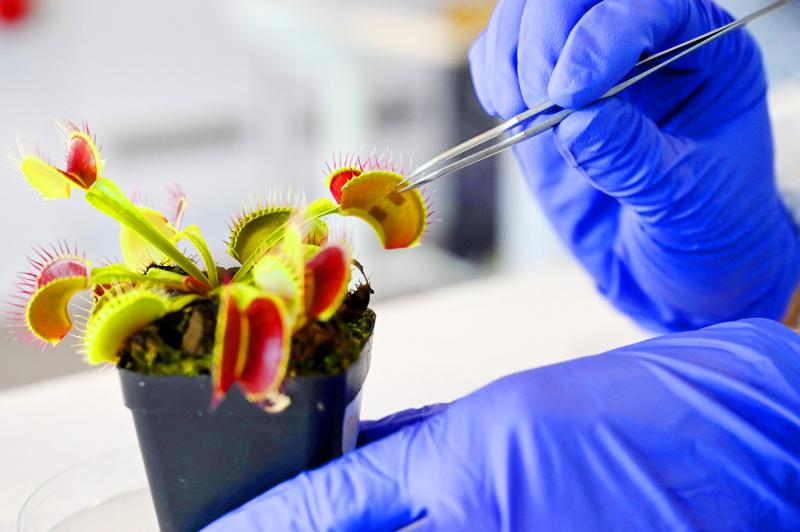Remote-controlled Venus flytrap “robo-plants” and crops that tell farmers when they are hit by disease could become reality after scientists developed a high-tech system for communicating with vegetation.
Researchers in Singapore linked up plants to electrodes capable of monitoring the weak electrical pulses naturally emitted by the greenery.
The scientists used the technology to trigger a Venus flytrap to snap its jaws shut at the push of a button on a smartphone app.

Photo: AFP
They then attached one of its jaws to a robotic arm and got the contraption to pick up a piece of wire half a millimeter thick, and catch a small falling object.
The technology is in its early stages, but researchers believe it could eventually be used to build advanced “plant-based robots” that can pick up a host of fragile objects which are too delicate for rigid, robotic arms.
“These kinds of nature robots can be interfaced with other artificial robots [to make] hybrid systems,” Chen Xiaodong (陳曉東), the lead author of a study on the research at Nanyang Technological University, told reporters.
There are still challenges to be overcome. Scientists can stimulate the flytrap’s jaws to slam shut, but cannot yet reopen them — a process that takes 10 or more hours to happen naturally.
The system can also pick up signals emitted by plants, raising the possibility that farmers would be able to detect problems with their crops at an early stage.
“By monitoring the plants’ electrical signals, we may be able to detect possible distress signals and abnormalities,” Chen said. “Farmers may find out when a disease is in progress, even before full-blown symptoms appear on the crops.”
Researchers believe such technology could be particularly useful as crops face increasing threats from climate change. Scientists have long known that plants emit very weak electrical signals, but their uneven and waxy surfaces makes it difficult to effectively mount sensors.
The researchers developed film-like, soft electrodes that fit tightly to the plant’s surface and can detect signals more accurately. They are attached using a “thermogel,” which is liquid at low temperatures but turns into a gel at room temperature.
They are the latest to conduct research communicating with plants.
In 2016, a Massachusetts Institute of Technology team turned spinach leaves into sensors that can send an e-mail alert to scientists when they detect explosive materials in groundwater.
The team embedded carbon nanotubes that emit a signal when plant roots detect nitroaromatics — compounds often found in explosives. The signal is then read by an infrared camera that sends out a message to the scientists.

‘TERRORIST ATTACK’: The convoy of Brigadier General Hamdi Shukri resulted in the ‘martyrdom of five of our armed forces,’ the Presidential Leadership Council said A blast targeting the convoy of a Saudi Arabian-backed armed group killed five in Yemen’s southern city of Aden and injured the commander of the government-allied unit, officials said on Wednesday. “The treacherous terrorist attack targeting the convoy of Brigadier General Hamdi Shukri, commander of the Second Giants Brigade, resulted in the martyrdom of five of our armed forces heroes and the injury of three others,” Yemen’s Saudi Arabia-backed Presidential Leadership Council said in a statement published by Yemeni news agency Saba. A security source told reporters that a car bomb on the side of the road in the Ja’awla area in

PRECARIOUS RELATIONS: Commentators in Saudi Arabia accuse the UAE of growing too bold, backing forces at odds with Saudi interests in various conflicts A Saudi Arabian media campaign targeting the United Arab Emirates (UAE) has deepened the Gulf’s worst row in years, stoking fears of a damaging fall-out in the financial heart of the Middle East. Fiery accusations of rights abuses and betrayal have circulated for weeks in state-run and social media after a brief conflict in Yemen, where Saudi airstrikes quelled an offensive by UAE-backed separatists. The United Arab Emirates is “investing in chaos and supporting secessionists” from Libya to Yemen and the Horn of Africa, Saudi Arabia’s al-Ekhbariya TV charged in a report this week. Such invective has been unheard of

‘SHOCK TACTIC’: The dismissal of Yang mirrors past cases such as Jang Song-thaek, Kim’s uncle, who was executed after being accused of plotting to overthrow his nephew North Korean leader Kim Jong-un has fired his vice premier, compared him to a goat and railed against “incompetent” officials, state media reported yesterday, in a rare and very public broadside against apparatchiks at the opening of a critical factory. Vice Premier Yang Sung-ho was sacked “on the spot,” the state-run Korean Central News Agency said, in a speech in which Kim attacked “irresponsible, rude and incompetent leading officials.” “Please, comrade vice premier, resign by yourself when you can do it on your own before it is too late,” Kim reportedly said. “He is ineligible for an important duty. Put simply, it was

US President Donald Trump on Saturday warned Canada that if it concludes a trade deal with China, he would impose a 100 percent tariff on all goods coming over the border. Relations between the US and its northern neighbor have been rocky since Trump returned to the White House a year ago, with spats over trade and Canadian Prime Minister Mark Carney decrying a “rupture” in the US-led global order. During a visit to Beijing earlier this month, Carney hailed a “new strategic partnership” with China that resulted in a “preliminary, but landmark trade agreement” to reduce tariffs — but